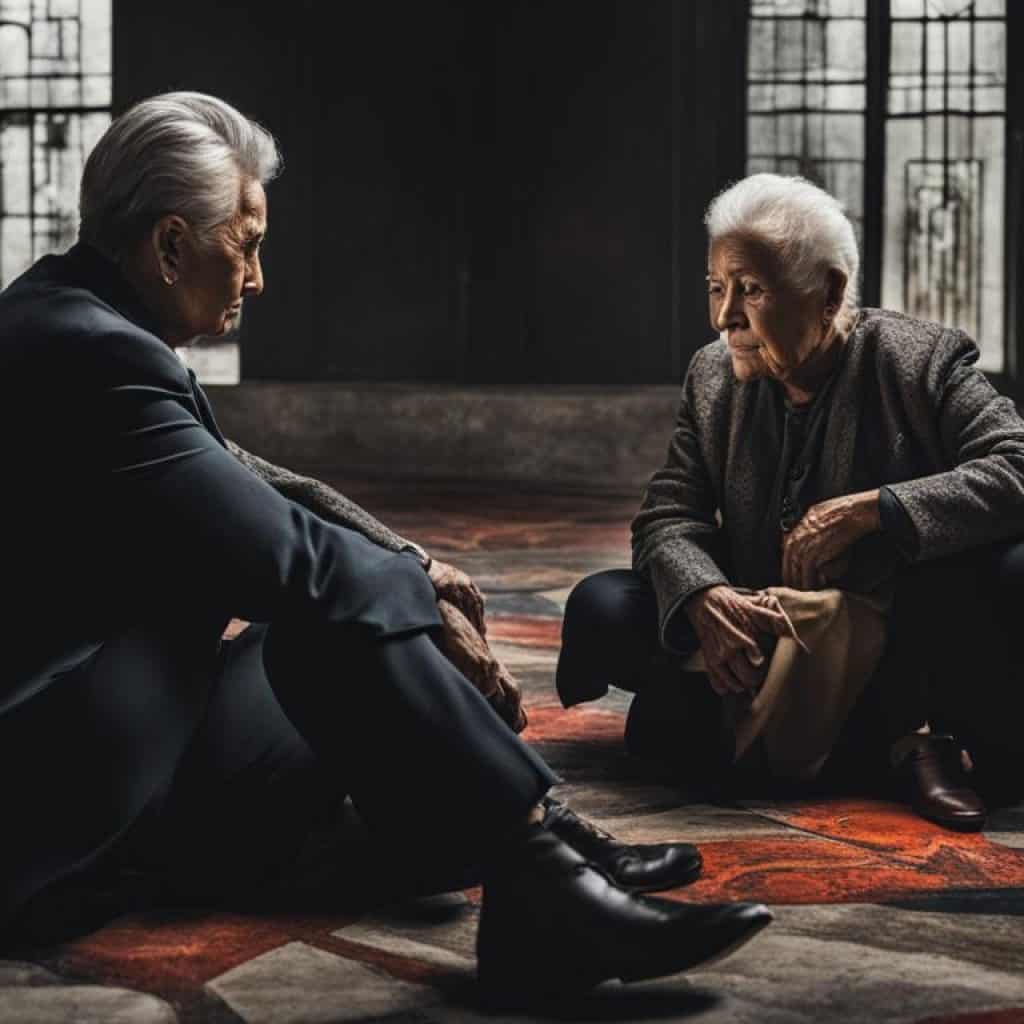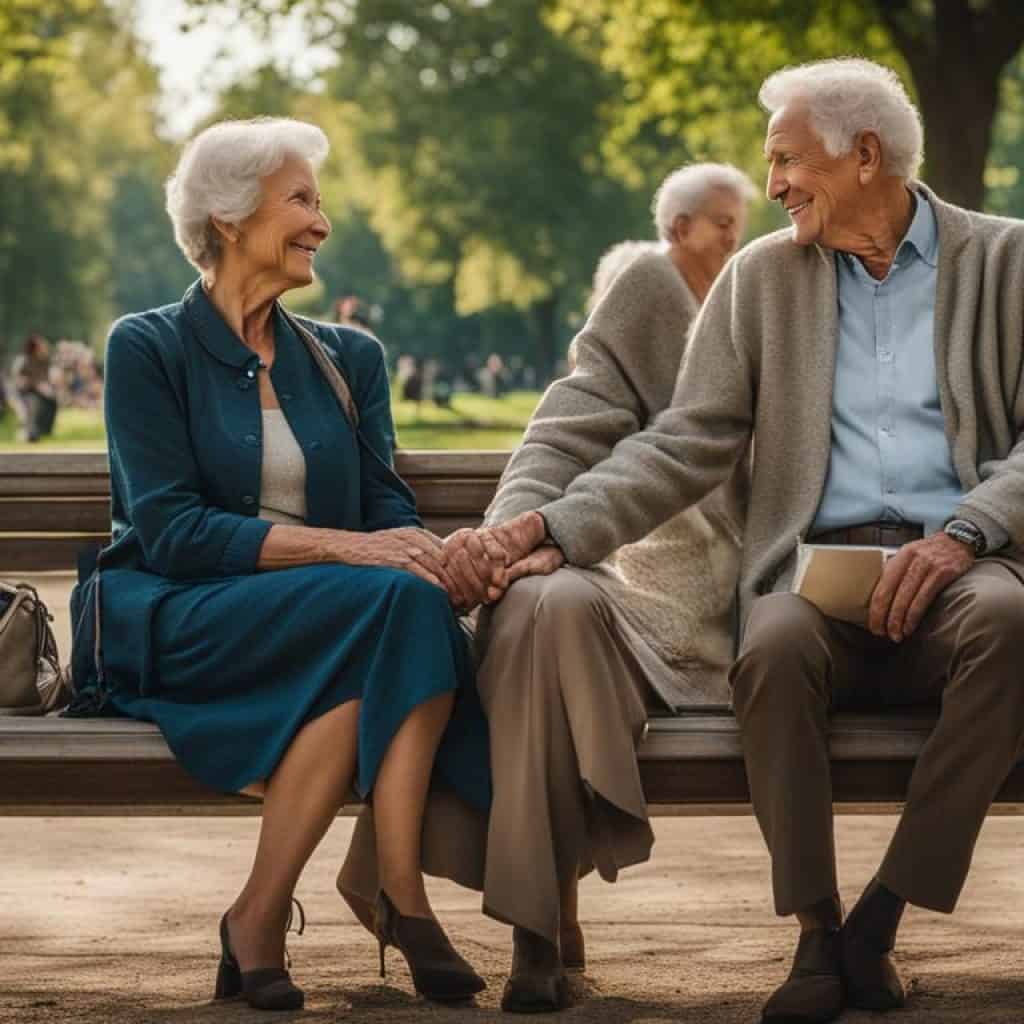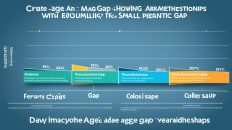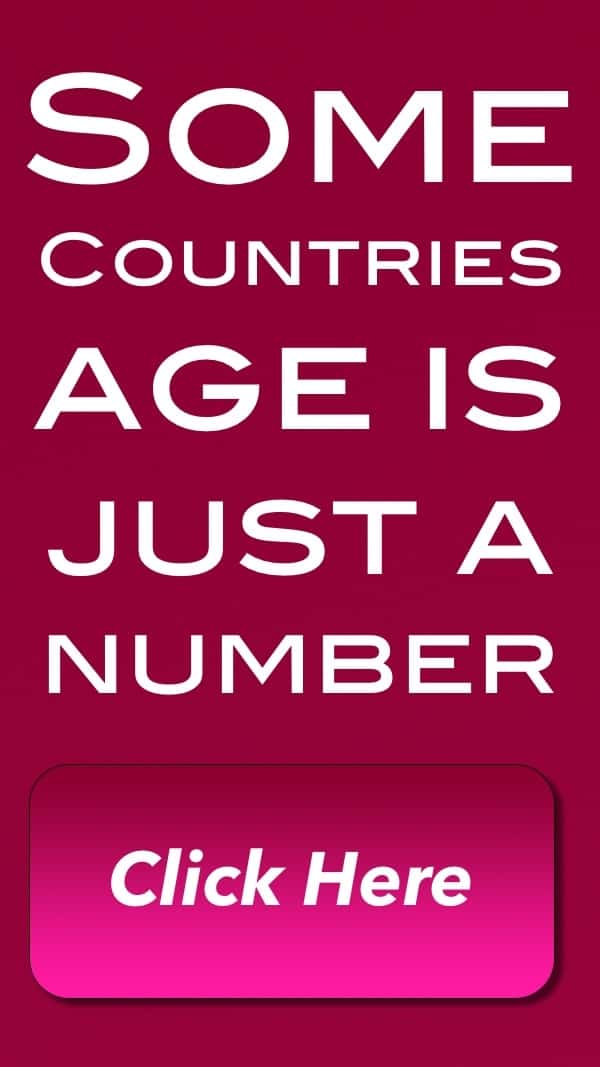When it comes to matters of the heart, age is often just a number. We’ve all heard stories of couples who defy societal norms and find love despite significant age differences. Perhaps you, too, have experienced the magic of an age gap relationship, where love transcends boundaries and defies expectations.
I remember the first time I fell in love with someone much older than me. It was a whirlwind romance that took me by surprise and opened my eyes to a world of possibilities. Our age difference was met with skepticism and raised eyebrows, but we didn’t let that deter us. We believed in the power of our connection and chose to focus on the love we shared.
Age gap relationships can be a source of profound joy, growth, and understanding. They can challenge us to examine our preconceived notions about love, break free from societal expectations, and embrace the beauty of unconventional connections. But they can also be accompanied by complexities and hurdles that require careful navigation.
In this article, we will delve into the debate surrounding age gap relationships, challenging assumptions and debunking misconceptions. We will explore the role of consent, examine power imbalances, and examine the legalities involved. Lastly, we will provide insights into personal experiences and key takeaways that can help us approach age gap relationships with empathy, understanding, and an open mind.
Key Takeaways:
- Age gap relationships can challenge societal norms and open doors to unexpected love and growth.
- Despite the potential for joy and connection, age gap relationships can also come with complexities and hurdles.
- Consent is crucial in navigating age gap relationships, and trust in the agency of consenting adults is essential.
- Power imbalances exist in relationships regardless of age difference, and it’s important to consider all dynamics at play.
- Misconceptions about age gap relationships often stem from societal stereotypes and should be challenged. +
Understanding the Debate
The societal opinions on age gap relationships are often polarizing and complex. While some individuals argue that these relationships need to be scrutinized and regulated to protect vulnerable individuals, others believe that such criticism can sometimes veer into puritanism and reinforce harmful stereotypes. It is essential to approach this topic with sensitivity and open-mindedness, recognizing the nuances that exist within age gap relationships.
Many people voice concerns about power imbalances and potential exploitation in age gap relationships. This is a valid concern, as imbalances can exist in any relationship, regardless of age. However, it is important to remember that factors like money and social status can also significantly impact power dynamics. It is crucial to consider all aspects of a relationship when critically examining power imbalances.
âAge is just a number, and love knows no boundaries. It’s unfair to make sweeping judgments about age gap relationships without considering individual experiences and unique dynamics.â – Emily Johnson, Relationship Counselor
Age gap couples often report feeling compatible in various aspects, including psychology, physicality, and sexuality. They emphasize the importance of shared values, common interests, and emotional connection rather than age alone. Maturity levels are not solely tied to age, and the younger partner can often be the more mature one. These personal experiences challenge stereotypes surrounding age gap relationships and underscore the need to approach each relationship as a unique case.
It is also important to acknowledge historical perspectives when examining age gap relationships. The discourse on age gaps has sparked a resurgence of notions from earlier campaigns against equalizing the age of consent. This highlights the complexity of the issue, combining various societal and political influences.
By navigating the debate surrounding age gap relationships with respect, empathy, and a focus on consent, we can better understand and appreciate the nuances that exist within these relationships. It is crucial to recognize that societal opinions are diverse, and personal experiences play a significant role in shaping perceptions of age gap relationships.
Pros and Cons of Age Gap Relationships
| Pros | Cons |
|---|---|
| Opportunity for personal growth and learning | Potential for power imbalances and exploitation |
| Breaking societal norms and expectations | Possibility of judgment and criticism from others |
| Unique perspectives and life experiences | Challenges in long-term compatibility |
| Emotional connection and shared values | Pressure from society and family |
Challenging Assumptions
Age gap relationships undoubtedly present unique challenges, often stemming from power imbalances that can arise due to differing life experiences and perspectives. However, it is essential to acknowledge that numerous other factors can significantly impact the dynamics of these relationships. Money, social status, and personal compatibility play substantial roles in shaping the experiences of age-gap couples.
Contrary to popular belief, age gaps alone do not exclusively determine the success or failure of a relationship. Age-gap couples often report feeling compatible on an emotional, psychological, physical, and sexual level, reaffirming that love and connection can bridge generational divides. While power imbalances are a valid concern, it is important to consider the bigger picture when examining the challenges faced by age gap couples.

“Relationships that have age disparities require open communication, mutual understanding, and a willingness to address any power imbalances that may arise.”
Age gap relationships provide the opportunity for personal growth, offering distinct perspectives and opportunities for learning from one another. The challenges faced by age gap couples should not overshadow the potential for love, companionship, and shared experiences across different stages of life.
Rejecting Stereotypes
Stereotypes surrounding age gap relationships do not always hold true. Maturity levels are not solely tied to age, and the younger partner can often be the more mature one. Many age gap couples express feeling like they are similar in age and share compatible qualities.
“Love knows no age. My partner and I have a significant age difference, but we connect on a deep level. We challenge each other intellectually and emotionally, and our age gap has never been an obstacle in our relationship.”
Age gap love defies societal expectations and proves that compatibility can transcend age. Age difference should not be the sole determinant of a successful relationship; instead, it should be about shared values, interests, and emotional connection. While every relationship is unique, age gap couples often find that their shared understanding and appreciation for each other surpass the boundaries imposed by society.
Challenging Stereotypes with Real Stories
Let’s take a look at some real stories from age gap couples who have successfully navigated love and companionship:
- Jane and David: Jane, 43, and David, 27, have been together for five years. Despite the significant age difference, they have built a strong foundation of trust and mutual respect. They complement each other’s strengths and have grown together as individuals.
- Lisa and Michael: Lisa, 30, and Michael, 44, have been married for ten years. Their age gap has never been an issue in their relationship. Instead, they credit their shared values and commitment to open communication for their lasting love.
- Kate and Jason: Kate, 35, and Jason, 50, have been dating for two years. They emphasize the importance of compatibility and emotional connection, which has allowed them to build a strong and fulfilling relationship.
These stories challenge the stereotypes surrounding age gap relationships and highlight the importance of focusing on love, compatibility, and shared values rather than age alone.
Benefits of Age Gap Relationships
Age gap relationships can bring unique advantages:
- Experience and wisdom: An older partner can offer valuable life experiences and guidance, leading to personal growth and broader perspectives for both individuals.
- Youthful energy and fresh perspectives: A younger partner can inject new energy, enthusiasm, and innovative ideas into the relationship, revitalizing the older partner’s outlook on life.
- Mutual learning and growth: With an age gap, there is an opportunity for continuous learning from each other’s experiences, interests, and generational perspectives.
- Breaking societal norms: Age gap relationships challenge societal expectations, promoting inclusivity and demonstrating that love is not confined by age boundaries.
Age gap relationships can be fulfilling and rewarding when approached with open-mindedness, respect, and a genuine connection.
Examining Precedents
The current discourse on age gap relationships has sparked a resurgence of notions from earlier campaigns against equalizing the age of consent. This highlights the complexity of the issue and the importance of considering historical perspectives.
“Our society has always grappled with questions of power dynamics and consent in relationships. Examining precedents helps us understand how age gap relationships have been viewed and addressed in the past.”
In the era of post-MeToo feminism and social justice politics, it is crucial to critically examine societal norms and power imbalances that may influence age gap relationships. By delving into historical perspectives, we gain valuable insights into the evolution of cultural attitudes and the complexities surrounding consent.
One notable precedent is the debate around equalizing the age of consent, which resurfaced during various feminist movements in the 20th century. These campaigns sought to challenge the existing legal frameworks that perpetuated harmful stereotypes and compromised the agency of young women.
By reevaluating these historical discussions, we can better understand the roots of contemporary debates surrounding age gap relationships. It allows us to question societal norms and explore alternative perspectives, fostering a more nuanced understanding of the dynamics at play.
Exploring the Impact of Post-MeToo Feminism
The advent of the post-MeToo era has brought important conversations about consent, power dynamics, and accountability to the forefront. As the fight against sexual harassment and gender inequality gains momentum, it shapes our understanding of relationships in profound ways.
Post-MeToo feminism challenges traditional narratives surrounding age gap relationships. It encourages us to critically examine power imbalances, informed consent, and the potential for exploitation. This critical lens enables a more thorough evaluation of the ethical implications associated with age differences in intimate relationships.
While considering historical precedents, it is essential to merge these insights with the current feminist discourse. This intersection allows for a comprehensive exploration of age gap relationships within the context of evolving social justice politics.
The examination of precedents provides a valuable foundation for informed discussions on age gap relationships. By acknowledging the interconnectedness of history, social politics, and individual experiences, we can navigate this complex terrain with empathy, understanding, and a commitment to meaningful change.
The Role of Consent
In age gap relationships, the concept of consent plays a pivotal role in ensuring ethical dynamics. It is important to actively listen to the experiences of individuals involved and believe them when they share their thoughts and emotions. Trusting the agency of consenting adults is crucial, as it empowers individuals to make decisions about their relationships based on their own desires and needs.
Consent goes beyond the mere absence of refusal; it requires enthusiastic and ongoing agreement from all parties involved. Open communication and dialogue are essential to establish and maintain consent throughout the relationship.
Addressing and acknowledging any instances of abuse or exploitation is also crucial within age gap relationships. It is essential to create a safe space where concerns and boundaries can be openly discussed and respected.
“Consent is not just about age, but about emotional maturity, personal autonomy, and mutual understanding. It is about respecting the boundaries and desires of each individual, regardless of their age difference.”
By prioritizing consent and creating an environment of trust and respect, age gap relationships can flourish in a healthy and ethical manner, promoting the well-being and happiness of all parties involved.
Contextualizing Abuse
While it is important to address the issue of abuse in relationships, it is essential to understand that abuse can occur in various contexts beyond age gaps alone. Focusing solely on age gaps can obscure the broader range of factors contributing to abusive dynamics. It is crucial to listen to survivors’ stories and support them, without making moral judgments about the consensual choices made by adults in their sex lives.
Acknowledging and addressing abuse is vital, regardless of whether the relationship involves a significant age difference or not. It is essential to provide a safe space for survivors to share their experiences and to promote understanding and empathy towards their unique situations.
It is crucial to listen to survivors’ stories and support them, without making moral judgments about the consensual choices made by adults in their sex lives.
By recognizing that abuse can happen in relationships of any age configuration, we can develop a more comprehensive and effective approach to combatting abuse. This entails creating a culture that prioritizes consent, respect, and safety for all individuals involved in intimate relationships.
Challenging Stereotypes in Queer Relationships
Criticisms of age gap relationships within the queer community can perpetuate harmful stereotypes. It is crucial to approach this topic with nuance and avoid generalizations. Queer individuals are not immune to sanctimonious attitudes, and individual experiences within age gap relationships can vary greatly.
Queer relationships come in all forms and combinations, just like any other relationship. However, when it comes to age gap relationships, queer couples often face additional scrutiny and criticism. Some people argue that age gaps in queer relationships are inherently problematic, based on assumptions about power dynamics and exploitation. While it is important to acknowledge and address instances of abuse or coercion, it is equally important not to make sweeping generalizations about all age gap relationships within the queer community.
“Love does not conform to societal norms or expectations. It transcends age, gender, and other boundaries. We must remember that queer individuals have fought for acceptance and recognition of their relationships, and their choices should not be subjected to unfair judgment or prejudice.”
– LGBTQ+ activist and relationship counselor
It is essential to recognize that queer individuals are just as capable of navigating healthy, consensual, and fulfilling age gap relationships as their heterosexual counterparts. Criticisms of age gap relationships within the queer community can perpetuate harmful stereotypes and stigmatize individuals who have found love and happiness in non-traditional partnerships.
Individual experiences within age gap relationships can vary greatly, influenced by factors such as personal dynamics, emotional maturity, and shared values. Some age gap couples report feeling deeply connected and supported by their partners, debunking the notion that these relationships are always exploitative or imbalanced. It is crucial to listen to the diverse voices within the queer community and avoid imposing rigid judgments based solely on age differences.
By challenging stereotypes and encouraging open dialogue, society can foster a more inclusive and accepting environment for all types of queer relationships, including those with age gaps. It is important to approach conversations about age gap relationships with empathy, recognizing the agency of individuals to make choices that bring them love and happiness.
Key Takeaways:
- Criticisms of age gap relationships within the queer community can perpetuate harmful stereotypes.
- Queer individuals are just as capable of navigating healthy, consensual, and fulfilling age gap relationships as their heterosexual counterparts.
- Individual experiences within age gap relationships can vary greatly, debunking the notion that these relationships are always exploitative or imbalanced.
- Approaching conversations about age gap relationships with empathy and avoiding generalizations can foster a more inclusive and accepting environment.
| Myth | Reality |
|---|---|
| Age gap relationships in the queer community are always exploitative. | Queer individuals have the agency to make consensual choices in their relationships. |
| Age gap relationships in the queer community reinforce power imbalances. | Power dynamics can exist in any relationship and are not solely determined by age difference. |
| Queer individuals in age gap relationships cannot have meaningful connections. | Age gap couples can form deep emotional bonds and have fulfilling partnerships. |
Examining Power Imbalances
Power dynamics play a significant role in all relationships, irrespective of age difference. Factors such as money and social status can greatly influence these dynamics, shaping the balance of power between partners. When analyzing power imbalances, it is essential to consider various aspects of the relationship.
The Influence of Money
Financial resources can impact the power dynamics within a relationship. When one partner has significantly more wealth than the other, it can create imbalances in decision-making and the distribution of resources. Financial disparities may lead to a sense of dependence or control, affecting the overall balance of power.
Social Status and Influence
Social status and influence can also contribute to power imbalances. Individuals with higher social standing may have greater access to resources, opportunities, and networks. This can result in an uneven distribution of power within the relationship, with one partner having more control or authority based on their social capital.
“Power differences in relationships are not solely determined by age; multiple factors come into play. It is crucial to examine the influence of money and social status when considering power dynamics.”
Examining Consent and Communication
When navigating power imbalances, it is essential to ensure that consent is freely given and respected by both partners. Open communication is key to understanding and addressing any power disparities that may arise. Recognizing the agency and voice of each individual is crucial for maintaining a healthy and equitable relationship.
Overcoming Power Imbalances
Addressing power imbalances requires ongoing effort from both partners. It involves fostering open dialogue, actively listening to each other’s concerns, and working towards finding solutions that promote equality and mutual respect. Seeking professional guidance, such as couples therapy or relationship counseling, can also provide valuable tools for navigating power dynamics.

| Factors Influencing Power Dynamics | Impact on Relationships |
|---|---|
| Financial resources | Can create imbalances and a sense of control or dependence. |
| Social status and influence | May lead to unequal distribution of power based on access to resources and opportunities. |
| Consent and communication | Open communication and mutual respect are crucial for addressing power imbalances. |
| Overcoming power imbalances | Requires ongoing effort, open dialogue, and seeking professional guidance if necessary. |
Debunking Misconceptions
When it comes to age gap relationships, there are numerous misconceptions that often arise from societal stereotypes. It’s important to challenge these assumptions and recognize that love and compatibility can exist across any age difference. Let’s debunk some of the common misconceptions surrounding age gap relationships:
The Older Partner is Always Exploitative
One common misconception is that the older partner in an age gap relationship is always seeking to exploit the younger partner. However, it’s essential to understand that true consent and mutual respect are the foundations of a healthy relationship, regardless of age. Many age gap relationships thrive on a strong emotional connection and shared values.
Age Gaps Automatically Equate to Power Imbalance
Another misconception is that age gaps always lead to power imbalances. While it’s true that power dynamics can be a factor in some age gap relationships, it’s important to recognize that power imbalances can exist in any relationship, regardless of age. Factors such as finances, life experience, and personality traits can influence power dynamics. Open and honest communication is crucial in navigating any power imbalances within an age gap relationship.
Youthful Partner Immaturity
There’s a misconception that the younger partner in an age gap relationship lacks maturity and is not capable of making sound decisions. However, maturity is not solely determined by age. It’s important to remember that individuals mature at different rates, and the younger partner may possess the emotional intelligence and life experience necessary for a fulfilling relationship.
“Age is but a number; it’s the connection and understanding between two individuals that truly matters.”
It’s crucial to approach age gap relationships with an open mind, recognizing that love and compatibility can transcend age differences. A successful age gap relationship is built on trust, understanding, and shared values, rather than adhering to societal expectations.
Personal Experiences
Personal experiences in age gap relationships can vary widely, with individuals reporting both positive and negative encounters. It is important to recognize that these experiences cannot be generalized or applied to all age gap relationships.
A wide range of factors can influence personal experiences in these relationships. While some individuals may have had negative encounters with older partners, others have found fulfillment and happiness. It is crucial to approach each relationship as unique and distinct, considering the dynamics and circumstances involved.
“I was initially hesitant about entering into an age gap relationship, but it turned out to be one of the most loving and fulfilling partnerships I have experienced. Our connection goes beyond our age difference, and we have built a strong foundation of understanding, respect, and shared values.” – Sarah, 30
It is essential to approach age gap relationships with an open mind and a willingness to communicate and understand each other’s perspectives. While there may be challenges unique to these relationships, personal experiences can be shaped by various factors, including compatibility, communication, and mutual respect.
Understanding and respecting the desires and boundaries of both partners is vital to fostering a healthy and fulfilling age gap relationship. By acknowledging and valuing each other’s perspectives, individuals in these relationships can navigate potential challenges and create nurturing connections.
Nurturing Healthy Age Gap Relationships
To nurture a healthy age gap relationship, it is important to:
- Communicate openly and honestly
- Respect each other’s boundaries and desires
- Address power dynamics and ensure both partners feel equal
- Seek support from friends, family, or professionals when needed
- Normalize discussions about age gap relationships to combat societal stigma
Age gap relationships can offer unique opportunities for personal growth and connection. By approaching these relationships with understanding and empathy, individuals can create fulfilling, loving partnerships that defy societal expectations and stereotypes.

Exploring Legalities
In age gap relationships, there are legal considerations that vary depending on the jurisdiction. While certain jurisdictions may scrutinize larger age gaps, many places recognize and allow consensual relationships with reasonable age differences. It is important to be aware of the legal requirements and boundaries in your specific location to ensure compliance and protect the rights of all parties involved.
Age of Consent
The age of consent refers to the minimum age at which an individual is considered legally capable of giving informed consent to engage in sexual activities. This age varies across different countries and regions. It is imperative to familiarize oneself with the age of consent laws in their specific area to ensure compliance and avoid legal consequences.
“The age of consent varies across different jurisdictions, and it is crucial to be knowledgeable about the laws in your area to navigate age gap relationships responsibly.”
Legal Age Gaps
To prevent the exploitation of minors, some jurisdictions have implemented laws that restrict age gaps between individuals engaging in sexual relationships. These laws aim to protect individuals who may be more vulnerable due to their age or lack of experience. The legality of age gaps varies, with some jurisdictions placing a limit on the maximum age difference between the partners.
Understanding Legal Requirements
When entering into an age gap relationship, it is important to familiarize oneself with the legal requirements and boundaries that may exist. Some jurisdictions may require consent from parents or legal guardians when one partner is below the legal age of adulthood. Being knowledgeable about these legal nuances can ensure that the relationship remains within the bounds of the law and respects the rights of all parties involved.
Summarizing Legal Considerations
Exploring the legalities surrounding age gap relationships helps individuals navigate the complexities of such partnerships responsibly. By understanding the age of consent laws and legal age gaps, individuals can make informed decisions and maintain relationships within the parameters of the law.
Conclusion
Age gap relationships offer both benefits and challenges, and it is essential to approach them with understanding and open-mindedness. While they are not inherently good or bad, age gap relationships can provide unique opportunities for love, companionship, and personal growth.
One of the benefits of age gap relationships is the potential for a nurturing dynamic, where partners can learn from each other’s life experiences and perspectives. Older partners can offer wisdom and guidance, while younger partners can bring fresh energy and enthusiasm.
However, it is crucial to navigate the challenges that may arise in age gap relationships. Power imbalances and societal opinions can create obstacles, but open communication and mutual respect can help address these issues. Consenting adults should prioritize consent and prioritize each other’s agency and well-being.
Ultimately, age gap relationships should be approached with an individualistic perspective, taking into account the unique circumstances and dynamics of each relationship. By fostering respect, open communication, and a focus on consent, age gap relationships can offer profound connections and personal growth for those involved.
FAQ
Are age gap relationships harmful?
Age gap relationships are not inherently harmful. While they can come with unique challenges, they can also be a source of love, companionship, and personal growth when approached with respect, open communication, and a focus on consent.
What is the societal opinion on age gap relationships?
Societal opinions on age gap relationships vary. While some people may have concerns about power imbalances and potential exploitation, it is important to consider various perspectives and avoid making generalizations.
What challenges do age gap relationships face?
Age gap relationships can face challenges such as power imbalances, societal judgment, and differing life experiences. It is crucial for couples to navigate these challenges through open communication, understanding, and respect for each other’s perspectives.
Do age gap relationships perpetuate harmful stereotypes?
Age gap relationships do not necessarily perpetuate harmful stereotypes. It is important to challenge assumptions and realize that love and compatibility can exist across any age difference.
Are there precedents for age gap relationships in history?
Yes, age gap relationships have existed throughout history. Examining historical precedents can provide insights into the complexities of age gap relationships and the societal attitudes towards them.
How does consent factor into age gap relationships?
Consent is crucial in age gap relationships. It is necessary to listen to individuals involved and trust their agency while also addressing and condemning any instances of abuse or exploitation.
Can abuse occur in age gap relationships?
Abuse can occur in any type of relationship, including age gap relationships. It is important to listen to survivors’ stories, support them, and address abusive dynamics, while avoiding moral judgments about consenting adults’ sex lives.
Do age gap relationships face criticism within the queer community?
Age gap relationships can face criticism within the queer community, but individual experiences within age gap relationships can vary greatly. It is important to approach this topic with nuance, avoiding generalizations and stereotypes.
Do power imbalances exist in age gap relationships?
Power imbalances can exist in any relationship, regardless of age difference. Factors like money and social status can significantly influence power dynamics. It is essential to consider all aspects of a relationship when examining power imbalances.
What are some misconceptions about age gap relationships?
Common misconceptions about age gap relationships include assumptions about maturity levels and the motivations of individuals involved. It is important to challenge these misconceptions and recognize that love and compatibility can exist across any age difference.
What are some personal experiences with age gap relationships?
Personal experiences with age gap relationships vary greatly. While some individuals may have had negative experiences, others have had positive and fulfilling relationships. It is crucial to recognize that individual experiences cannot be generalized.
What are the legal considerations in age gap relationships?
The legality of age gaps varies across jurisdictions. While larger age gaps may face legal scrutiny, many places allow for consensual relationships with reasonable age differences. It is important to be aware of legal requirements and boundaries.
Are there benefits to age gap relationships?
Age gap relationships can bring various benefits, such as shared experiences, different perspectives, and personal growth. However, it is important to approach these relationships with respect, open communication, and a focus on consent.








Add comment